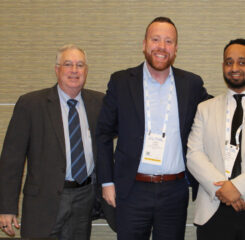Interview with Dr. David Grabowski January 12, 2022
Dr. David Grabowski, Professor of Health Care Policy in the Department of Health Care Policy at Harvard Medical School, joined the January 12, 2022 LeadingAge Coronavirus Update Call. He responded to questions from Ruth Katz and from callers. Here is a summary of the conversation:
Q: The workforce crisis is getting worse. There seems to be mostly black and white thinking about this issue. How might we move beyond that?
A: Many people would say that “crisis” isn’t a strong enough word. With the pandemic we have a crisis on top of a crisis. Even prior to the pandemic, we had real staffing challenges. Someone has called the current situation a staffing apocalypse. Staff cases are now at a pandemic high. In many markets, we are hearing that hospitals are having challenges discharging patients. We are back to states considering mandating that nursing homes take COVID patients.
There are ways we can take more of a middle ground approach and be creative in how to increase staffing. It is not going to work to say “get more staff” – nursing homes would love to hire more people! As an example, Minnesota is deploying National Guard members to nursing homes. That’s not a long term solution, but in an emergency that can be helpful. As cases start to come down, we need to determine how we can fortify and protect the workforce going forward. I believe vaccines and booster efforts are part of that. Also, it’s going to take money and the federal government should think about additional provider relief funding targeted to the workforce. We need to put more dollars into paying staff a living wage. That is a policy issue not a nursing home issue
Q: We hear from members what it is costing them to pay temporary staffing agencies. The rates are extremely high – many times higher than the regular workers who often have more responsibility and less flexibility, while they are the ones maintaining ongoing relationships with one another and with residents. What are your thoughts?
A: Yes, we are hearing huge numbers. This is not only bad for the bottom line, it is bad for continuity of care, and it is bad for the morale of the regular staff. This is a huge issue which may need to be tolerated in the short run but fortifying staff by putting more money into regular direct care staff is essential in the long run. This will take policy change and recognizing the difficult and critical work direct care workers do. I hate the term “unskilled” – these individuals are very skilled and whoever uses that term has never spent time in a nursing home observing their work.
Q: So many articles we read vilify nursing homes around the staffing issue. Does the media understand the nature of the crisis?
A: Some do, but most don’t. They think these are easily solved problems and that perhaps nursing homes need to scale back and just not take as many patients. They don’t recognize that it is about long stay residents and also how hard it is on staff when nursing homes are short-staffed. Journalists are generally more interested in hospitals and are more likely to be interested when the issue is framed as “hospitals can’t discharge”. The pandemic has generated some good media attention to nursing homes, but we need to generate more interest in nursing homes and their concerns because all health care is interrelated.
Q: Last week CMS announced they would be posting staffing turnover and weekend staffing data and including that in Nursing Home Compare. How do we reconcile this with the nationwide staffing issues that are happening now?
A: I do believe these are useful measures to add to Nursing Home Compare. On the other hand, the timing is very unfortunate. It feels like a gut punch to nursing homes that are struggling right now. Longer term it may shed light on the critical staffing issues and our need to invest more in staffing. It is a policy issue, not a nursing home issue. It is not going to surprise anyone when the CMS measures show high turnover. I hope this will not be “this is another thing nursing homes need to do better” but rather seeing that turnover reflects the need to address the underlying issues. We need to have good work cultures, career programs, and elevate the work, but the number one issue is improving pay and having good benefits. That’s the primary way to address this issue. Nursing homes can’t do that on their own – we need better Medicaid reimbursement.
Q: What are you thinking about vaccine mandates?
A: I hear such division around this issue. We are doing pretty well with respect to resident vaccination, though we still have a way to go with boosters – including for staff. Only about 25% of staff have received boosters. We now have five states that have implemented booster mandates, which is very different from some other states. I am glad to see that CMS is not treating all states the same and that CMS is having a gradual on-ramp to the states that have a lot of work yet to be done.
Q: You are on the panel that has been working on the National Academies’ look at nursing homes- the first since 1986. I know you can’t share specifics yet, but what can you tell us?
A: The report will be coming out soon and a lot of hard work has gone into it. There are 15 of us from a variety of backgrounds who are on the panel. There will be a range of recommendations on a variety of issues. Stakeholders will be excited about lots of parts of our report, and there will likely be some they will disagree with. It should be released in February or March, and I would be glad to come back and talk about it to explain our recommendations.
Q: As a field, we have serious thinking to do about the future of the nursing home model – how it can be improved and how it can be sustainable in the future. This level of care will always be needed. How do you hope things work in the future and what can we do to lead this change?
A: It is a false dichotomy to pit home- and community- based care against nursing home care. As you say, we will need both. For nursing homes, there are elements we will need to think about reimagining. For example, we need to be able to pay staff a living wage and emphasize the importance of the work. We need to work not only on quality, but also on the way in which nursing homes are portrayed and reimbursed. I think some of the smaller home models may evolve and become even more person-centered in their cultures. It will take money, but also leadership. I hope providers will have interest in taking leadership to reinvent and reimagine.
Q: What are your thoughts as to why there has not been an emphasis on COVID therapeutic modalities in nursing homes?
A: That is certainly one of my frustrations – that nursing homes are often at the end of the line. We saw that with PPE, with testing, and now with therapeutics and that reflects both ageism and classism. We need to advocate with policy makers about the ways in which this is inequitable. I hope LeadingAge members can partner with researchers and with media to change this.
Q: Many cases of COVID are coming into nursing homes from visitors, not staff. What will it take to be able to hold visitors to the same protective measures as staff?
A: Everyone – families, residents and nursing homes – want people to be able to visit. The goal is to keep everyone safe, so it seems reasonable that there are requirements for visitors – PPE, testing, vaccination and boosters. I would hope everyone would want that. It is not just about the health of my loved one, but about the health of everyone in the building. Vaccinations and boosters could be streamlined so that the process is less onerous for visitors and for staff. Vaccination information could be scanned once so that I don’t have to show my cards every time I come. Testing can be streamlined, too.
Q: Agency staff are making great money and have less responsibility than regular staff. How do we flip that for a more stable, satisfied workforce?
A: It certainly shouldn’t be as it is now. Unfortunately, it reflects the current market. We need to figure out if there are ways nursing homes can offer the kinds of flexibility and remuneration that temporary agencies do. This will require policy changes – particularly to increase Medicaid reimbursement.

Most Recommended
October 15, 2025
 Shutdown Week Three: Impact of Ongoing Closure on Affordable Housing
Shutdown Week Three: Impact of Ongoing Closure on Affordable Housing
December 10, 2025
Fiscal Year (FY) Funding 2026
October 07, 2025
Immigrant Workforce Matching Program Brings Workforce Relief
Recently Added
December 17, 2025
 Colleagues on the Move, December 17, 2025
Colleagues on the Move, December 17, 2025
December 16, 2025



